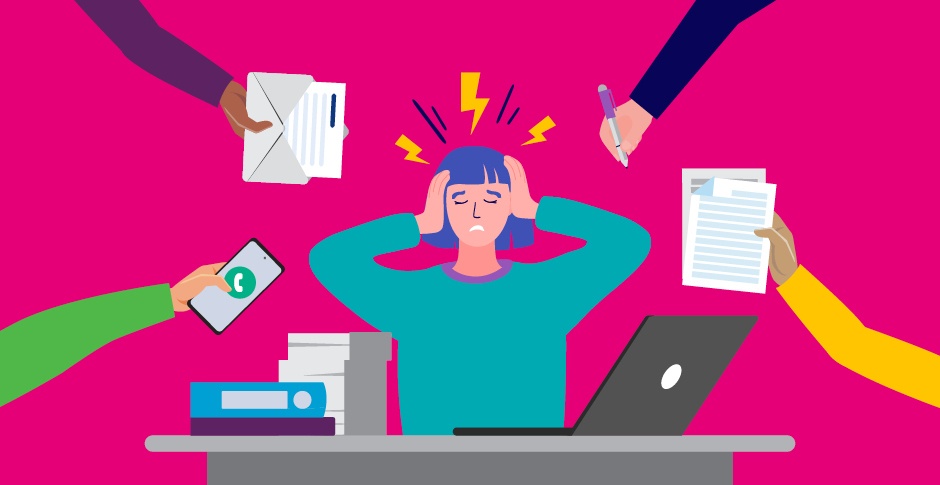9 signs you’re burnt out from work
Have you recently found yourself behaving out of your normal character in the workplace, possibly over small, everyday things – like emails from colleagues or meetings that run over?
Have you found yourself dragging your feet on routine tasks? Have things that once got you up in the morning (or at least gave you some sense of satisfaction) now made you want to bang your head on your desk?
If your answer to any of the above questions is yes, you might be experiencing work burnout.
A simple explanation for feeling “meh”
Burnout is a state of exhaustion: physical, mental and emotional. It’s something that usually sneaks up on you over time, making you feel generally lacklustre for no apparent reason.
While different for everyone, there are some general signs that you’re approaching this state. Maybe you’re feeling unreasonably stressed over tiny things. Maybe you’re struggling to get motivated and constantly procrastinating. Maybe you’re rolling into the workplace late, drinking more coffee than normal, forgetting simple things or even missing deadlines. Maybe it’s all of the above.
According to Psychologist Sabina Read, when it comes to work burnout, the first things to slip are generally diet, sleep, exercise and connection. You might feel exhausted, withdrawn from people and even fanaticise about running away.
“A lot of people become mindless,” Read says. “There are habitual practices at play when we’re on the treadmill of life. We’re not tuned into ourselves; we get up and do what we have to do and then go to bed. But when we circuit-break that, we can stop and ask ourselves what will make us feel better. What’s the barrier? Why aren’t we doing it? And then we can get back on track. What fills your cup?”
Burnout is very common right now
Burnout in the workplace is higher than ever. SEEK data reveals 67% of people have experienced burnout, with the top two causes being poor work-life balance and being overwhelmed by workload. Taking a day off is the top coping mechanism for managing burn out, but concerningly a quarter claim ‘just pushing through’ is their technique.
So, what are the signs to look for that you’re burnt out?
While burnout isn’t currently recognised as a standalone clinical diagnosis, researchers from the UNSW School of Psychiatry and the Black Dog Institute have developed a checklist of 9 signs and symptoms to help people identify and start working through burnout. These are:
- anxiety/stress
- depression/low mood
- irritability/anger
- sleep disturbances
- lack of motivation/passion
- lack of concentration/memory loss/brain fog
- withdrawal from others
- physical symptoms (including headaches, body aches, nausea and low libido)
- and emotional fragility.
Future of mental health at work
For some people, burnout can present itself as a clinical condition, such as depression or anxiety. For others, it might come closer to a general sense of languishing.
Peta Slocombe, a Psychologist and CEO at Performance Story, is an advocate for proactive mental health screening. She believes that burnout can be prevented and that early intervention is key.
“Science has given us incredible insights into being able to predict, and in some cases even prevent, challenges from occurring. It’s time we used that knowledge to match people with solutions instead of rolling entire workforces through the same programs. Not everyone needs counselling or medication, and understanding the unique reasons people struggle means [we can find] a faster way to solve it.”
Proactive steps to address burnout
The best way to deal with burnout isn’t necessarily to throw it all in and find a new job.
Considering burnout resonates with so many people, Read says, “comparative suffering” is an issue. This is when people invalidate their feelings because they think someone else has it worse. They’re not old enough, not senior enough, not juggling enough commitments outside of work. We look at those we perceive to be doing it tougher and think, “I don’t have a right to feel this way”.
“We’re all trying to carve out a life with meaning and impact, but we all face hurdles and challenges that can lead to burnout,” she says. “We need to acknowledge it can strike anyone at any time.”
According to Read, most people know intuitively what makes them feel good, such as seeing friends, cooking a healthy meal at home, playing music or just spending some time outside. The trick is to recognise it and make it happen.
Originally published on news.com.au, republished with permission.
Read more
